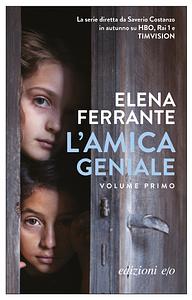You need to sign in or sign up before continuing.
Take a photo of a barcode or cover
emotional
inspiring
tense
medium-paced
Plot or Character Driven:
Character
Strong character development:
Yes
Loveable characters:
Complicated
Diverse cast of characters:
No
Flaws of characters a main focus:
Yes
reflective
sad
medium-paced
Plot or Character Driven:
Character
Strong character development:
Yes
Loveable characters:
Complicated
On a sunless Monday morning after my return to New York, while seated at his office on the fourth floor of ivy-encrusted Milbank Hall, for our equally Ivy-encrusted tête-à-tête, my Italian neuropsychology professor with a PhD from Harvard and a bread crumb trail of publications mentions to me, off-handedly, that he shares with his mother five years of an elementary school education, and a penchant for Elena Ferrante’s Neapolitan novels.
I can think of no better capstone to the Italian feminist fall curriculum than My Brilliant Friend, partly because this is the most masterfully crafted garden of sentences I’ve ever had the privilege of trespassing upon, and also partly because I just started a Sally Rooney.
My Brilliant Friend follows two girls navigating a volatile world in a poor neighborhood of Naples. There’s this play between brutal undercurrent of violence and on the other hand, these two young girls whose friendship spans years and has that epic, folkloric quality. The story of Elena and Lila is founded on the tenets of girlhood — double dares, unhealthy hyperfixations, the race to understand the true nature of the world. I'd put it on the shelf next to films like The Florida Project, implaceable horror movie scenes of little girls playing jump rope to morbid little songs, The Goldfinch (of course), Girl, so confusing - Charli XCX, Lorde, and the 1999 manga Nana.
Ferrante's hand has a morphological richness to it that doesn't quite carry over from the original Italian, but some sentences are true works of art.
“that the human condition was so obviously exposed to the blind fury of chance that to trust in a God, a Jesus, the Holy Spirit—this last a completely superfluous entity, it was there only to make up a trinity, notoriously nobler than the mere binomial father-son—was the same thing as collecting trading cards while the city burns in the fires of hell.”
“And they thought that what had happened before was past and, in order to live quietly, they placed a stone on top of it, and so, without knowing it, they continued it, they were immersed in the things of before, and we kept them inside us, too.”
Then Elena and Lila grow up and their world gets bigger and more complex, and the big stuff is big and the complexities are complex. Like this physical and ideological entrapment within their neighbor and its culture, intergenerational trauma patterns, and the power/privilege/pointlessness of education, and leather shoes, god, so much about Italian leather shoes. There’s so much else to say, but I’ll save it for the sequel.
So the next time you encounter that rare breed of man that can still look at you, affronted, with a doe-eyed lack of self-consciousness, and have the wherewithal to ask you (again) how you’ve never watched The Godfather because it’s so universally appealing and encapsulative of the human condition, and yes I concede I’m also describing myself, look utterly appalled for a few seconds and hit him with the: “You mean you’ve never read (dramatic pause) Eleeeeena Ferraaaaante?”
I can think of no better capstone to the Italian feminist fall curriculum than My Brilliant Friend, partly because this is the most masterfully crafted garden of sentences I’ve ever had the privilege of trespassing upon, and also partly because I just started a Sally Rooney.
My Brilliant Friend follows two girls navigating a volatile world in a poor neighborhood of Naples. There’s this play between brutal undercurrent of violence and on the other hand, these two young girls whose friendship spans years and has that epic, folkloric quality. The story of Elena and Lila is founded on the tenets of girlhood — double dares, unhealthy hyperfixations, the race to understand the true nature of the world. I'd put it on the shelf next to films like The Florida Project, implaceable horror movie scenes of little girls playing jump rope to morbid little songs, The Goldfinch (of course), Girl, so confusing - Charli XCX, Lorde, and the 1999 manga Nana.
Ferrante's hand has a morphological richness to it that doesn't quite carry over from the original Italian, but some sentences are true works of art.
“that the human condition was so obviously exposed to the blind fury of chance that to trust in a God, a Jesus, the Holy Spirit—this last a completely superfluous entity, it was there only to make up a trinity, notoriously nobler than the mere binomial father-son—was the same thing as collecting trading cards while the city burns in the fires of hell.”
“And they thought that what had happened before was past and, in order to live quietly, they placed a stone on top of it, and so, without knowing it, they continued it, they were immersed in the things of before, and we kept them inside us, too.”
Then Elena and Lila grow up and their world gets bigger and more complex, and the big stuff is big and the complexities are complex. Like this physical and ideological entrapment within their neighbor and its culture, intergenerational trauma patterns, and the power/privilege/pointlessness of education, and leather shoes, god, so much about Italian leather shoes. There’s so much else to say, but I’ll save it for the sequel.
So the next time you encounter that rare breed of man that can still look at you, affronted, with a doe-eyed lack of self-consciousness, and have the wherewithal to ask you (again) how you’ve never watched The Godfather because it’s so universally appealing and encapsulative of the human condition, and yes I concede I’m also describing myself, look utterly appalled for a few seconds and hit him with the: “You mean you’ve never read (dramatic pause) Eleeeeena Ferraaaaante?”
emotional
informative
reflective
medium-paced
Plot or Character Driven:
A mix
Strong character development:
Yes
Loveable characters:
Complicated
Diverse cast of characters:
No
Flaws of characters a main focus:
Yes
just as good as last time, though i was more analytical this time around for a school project im doing on it 😼
i can definitely see why this was voted the best book of the 21st century, and i’ve heard that reading the remaining installations of the quartet only solidifies this!
i was hesitant to read this at first, not sure why, maybe because i had seen it too often? but i’ve come to love stories of female friendships; i think it’s something that is hard to put into words. it’s unique and special and complicated, as seen with lila and elena, but i think there are moments in this novel that transcend cultural norms and historical context. i definitely found moments where elena put things that i had felt before, but couldn’t describe, exactly into words. and that’s exactly what makes a book memorable for centuries to come!
i was hesitant to read this at first, not sure why, maybe because i had seen it too often? but i’ve come to love stories of female friendships; i think it’s something that is hard to put into words. it’s unique and special and complicated, as seen with lila and elena, but i think there are moments in this novel that transcend cultural norms and historical context. i definitely found moments where elena put things that i had felt before, but couldn’t describe, exactly into words. and that’s exactly what makes a book memorable for centuries to come!
dark
reflective
Plot or Character Driven:
Character
Diverse cast of characters:
Complicated
I initially struggled to get into it, but eventually became invested. It’s not just about the girls’ relationships, but also a look at a culture and period. I’m invested enough in the story to continue with the next series book. I enjoyed listening to the audio version, especially the pronunciation of names.
emotional
inspiring
reflective
sad
medium-paced
Plot or Character Driven:
Character
Strong character development:
Yes
Loveable characters:
Yes
Diverse cast of characters:
No
Flaws of characters a main focus:
Yes
emotional
informative
reflective
slow-paced
Honestly it’s my fault for picking up a coming of age story when I know that I don’t gravitate towards them 😭 ‘A Tree Grows in Brooklyn’ is one of the few exceptions. I’ve heard so many good things about this one and gave it a chance but I’ll be honest with myself in saying that if I’m struggling this much with the first book then there’s no way I’d feel inclined to pick up the rest in the series.
I’ve also been in a reading slump (unsure if it’s partly because of my dread of reading this one. Not a good sign 😅) ‘The Master and Margarita’ was so incredible to me that I need something just as enjoyable as that for now..
I’ve also been in a reading slump (unsure if it’s partly because of my dread of reading this one. Not a good sign 😅) ‘The Master and Margarita’ was so incredible to me that I need something just as enjoyable as that for now..
challenging
emotional
informative
reflective
medium-paced
Plot or Character Driven:
Character
Strong character development:
Yes
Loveable characters:
Complicated
Diverse cast of characters:
Yes







